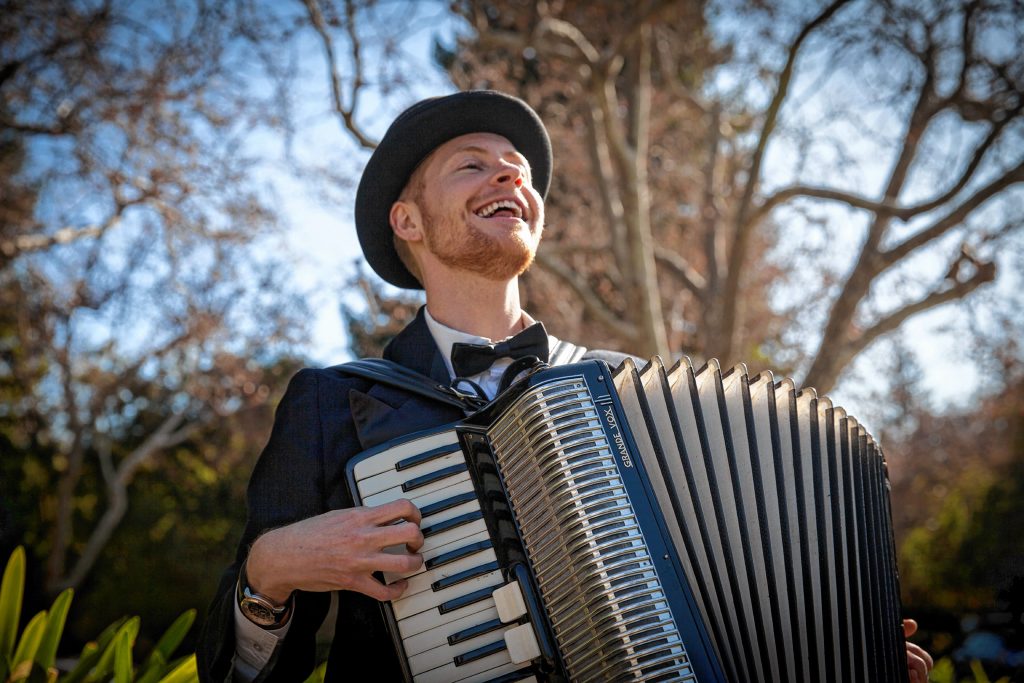Adhamh Roland has the look down pat: black-jacket tuxedo, bowler hat, and a friendly twinkle in his eye that speaks volumes. “Yes,” his smile says, “I have an accordion. Yes, I show up unannounced, bearing a special message from someone you know. And yes, I’m going to sing it to you while everyone’s watching.”
A native of St. Louis, Roland spent eight years in the San Francisco bay area before moving to Leeds last September. On Valentine’s Day, he re-launched his West Coast business, Tin Can Singing Telegram, for the Valley market.
The Advocate caught up with Roland, who also works as a social justice educator and facilitator, about his side gig as an accordion-toting entrepreneur. Here’s our conversation, edited and condensed for clarity.
Hunter Styles: Tin Can Singing Telegram is about five years old now. How did it start?
Adhamh Roland: I’ve been playing music since I was 13, so writing songs was always just something I did. I was in school in the Bay Area, and when I graduated I needed gigs in-between some seasonal work. The recession probably had something to do with the fact that I couldn’t find it, and I just had to create it.
Hunter: There’s always some risk in starting your own business. How do you track your success?
Adhamh: It was definitely slow at first in the bay area. But once I got a Yelp account and people were giving me rave reviews there, I started getting several orders a week, and I had to turn down more than I was getting. Then when I moved here, I wasn’t sure that Western Mass had the population density to support something like this. But every time I mentioned it, people would say, hello? Northampton! People are plenty weird here. So I’m giving it a whirl. I work other jobs, but this is fun and familiar and creative. My job is getting to make people’s day.
Hunter: What’s the process of receiving an order, then writing a song?
Adhamh: It’s definitely more convenient for me if people order a week or so in advance — I’ll charge higher for a rush delivery — but I’ve gotten to a point where the songwriting happens really easily. I read the words the customer wants sung, and I try to get a feel for that person and that relationship. It’s not a formula, but it’s a well-oiled channel for me at this point.
Hunter: Your publicity video shows you delivering telegrams to outside events, offices, people working out at the gym… You must end up delivering to strange places.
Adhamh: I have a 300-mile service radius. On Valentine’s Day I delivered one to an employee at a 7-Eleven in Keene, New Hampshire. I thought: awesome, my first convenience store delivery! But he was hiding in the back, looking down at the floor, because he was so shy. In that case, I tried to make the telegram a little more tender and understated. Some people are embarrassed. But mostly, we’re trying to celebrate people and make a show out of it.
Hunter: Are people ever irritated or angry when you show up?
Adhamh: I don’t think so. Maybe if I was wearing a pink gorilla suit or something. Some of those services are just about embarrassing people, and that can piss people off. I’m not interested in doing that at all.
Hunter: Well, you put work into personalizing each of these.
Adhamh: Definitely. I’m a conduit for a person who may or may not be there — I’m the voice of that relationship. When someone orders a telegram, I have to distill the main sentiment behind it. It’s more than just taking someone’s words and sticking them into a song. I have to find the salient points that I think will strike a chord.
Once or twice, someone has wanted to, like, woo their ex-girlfriend with a telegram. And I’ll take some liberties to highlight the parts that seem more generative to that relationship. There’s a little bit of couples counseling involved sometimes.
Hunter: Why else do people order these?
Adhamh: Mostly birthdays. I’ve asked people to prom. I’ve proposed for people. I’ve sung wedding vows.
Hunter: Why the accordion?
Adhamh: I spent a summer in Maine on a farm that happened to have one. I grew up playing guitar and piano, so I just taught myself how to play it. I think it’s a big sell for people. So many people have stories about accordions. It seems like everybody’s grandmother or grandfather had one in the house at some point. It transcends culture — it’s such a memorable object.
Hunter: How would you like to see this business grow and change in the coming months?
Adhamh: I would love for this to be a sliding scale, donation-based service. I want it to be something that everyone can access. When I moved here, I revamped my website to make it more corporate-event savvy. Those orders usually take the same amount of time to prepare but pay, like, six times the money. Ideally I’d do more of those, so that I could afford to charge others on a sliding scale.
Hunter: Does your work in education influence how you think about connecting people?
Adhamh: Totally. I’m trained not as a teacher but as a facilitator. That word, when you break it down — “facile” — means “to make easier.” That’s been my role in social justice and education — and in the telegrams, too. How do I make it easier to share what needs to come across? Everyone has their wisdom, and teaching, like music, is a matter of drawing it out.
Contact Hunter Styles at hstyles@valleyadvocate.com.



